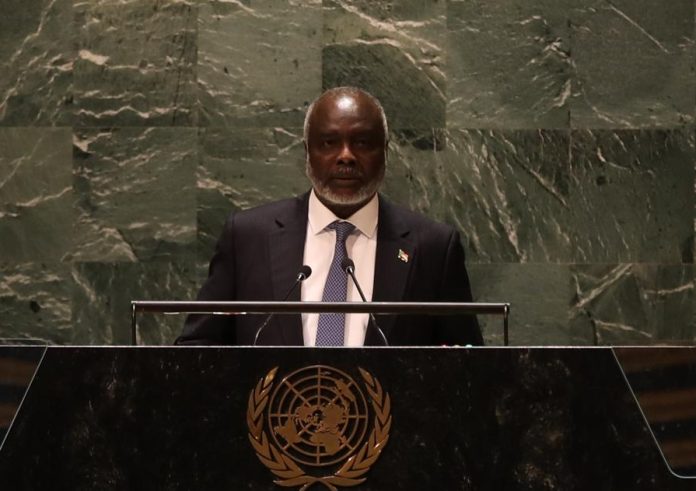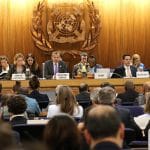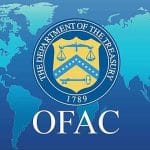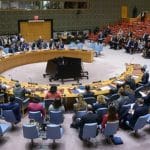On September 12, the U.S. Department of the Treasury through the Office of Foreign Assets Control (OFAC) imposed sanctions on two Sudanese Islamist actors for “destabilizing Sudan and undermining the goal of a democratic transition.”
Both designations under Executive Order (E.O.) 14098 target Gebreil Ibrahim Mohamed Fediel (Gebreil) — Sudan’s Finance Minister and leader of the Justice and Equality Movement (JEM) and The Al-Baraa Bin Malik Brigade (BBMB) — an Islamist militia group.
Although Sudan already faces sanctions for chemical weapons use in 2024, Washington cites multiple reasons for announcing the new sanctions, explained in detail below, but in a nutshell: Both parties’ role in the ongoing war, ongoing cooperation/training/technical support from the Iranian government, including the Islamic Revolutionary Guard Corps (IRGC), and both parties’ efforts to undermine or derail Sudan’s transition toward civilian-led governance and peace processes. The sanctions are also part of a U.S. effort to limit the influence of Islamist actors in Sudan, especially those related to or reminiscent of the Bashir-era regimes.
The new sanctions fit into a pattern: Washington is directly targeting actors seen as obstacles to peace, and also specifically actors with Islamist identity or history, particularly those with Iran linkages.
Regional analysts see these sanctions not in isolation but as part of a coordinated international pivot; they seem to be linked with proposed peace roadmaps involving Saudi Arabia, UAE, Egypt and the U.S. that explicitly aim to reduce the role of Islamist groups in future governance.
However, there is some concern that these sanctions might narrow the space for mediation: groups under sanctions might withdraw from negotiations, seeing them as unfair or pre-judged. That could make reaching a comprehensive peace deal harder. On the other hand, some see the sanctions as providing more leverage to civilian and peace actors, by working to weaken Islamist groups who have been undermining earlier transition frameworks.
Text of U.S. Treasury Department statement:
Treasury sanctions Sudanese Islamist actors to counter regional instability and support for Iran
“Today (September 12), the U.S. Department of the Treasury’s Office of Foreign Assets Control (OFAC) imposed sanctions on two Sudanese Islamist actors — Gebreil Ibrahim Mohamed Fediel (Gebreil) and the Al-Baraa Bin Malik Brigade (BBMB) — for their involvement in Sudan’s brutal civil war and their connections to Iran. These sanctions aim to limit Islamist influence within Sudan and curtail Iran’s regional activities, which have contributed to regional destabilization, conflict, and civilian suffering. The United States remains committed to working with regional partners to achieve peace and stability in Sudan, ensuring that the country does not become a safe haven for those who threaten Americans and the national interests of the United States.
“Sudanese Islamist groups have formed dangerous alliances with the Iranian regime. We will not stand by idly and allow them to threaten regional and global security,” said Under Secretary of the Treasury for Terrorism and Financial Intelligence John K. Hurley. “The Treasury Department is using our powerful sanctions tools to disrupt this activity and protect U.S. national security.”
Sudanese Islamist elements have long been a destructive force in Sudan, most notably during the Islamist regime of former President Omar al-Bashir (Bashir), who governed Sudan for 30 years until 2019. More recently, Sudanese Islamists have played a key role in derailing Sudan’s progress toward a democratic transition, including by undermining the former civilian-led transitional government and the Framework Political Agreement process.
This contributed to the outbreak of fighting between Sudanese Armed Forces (SAF) and the Rapid Support Forces (RSF) in April 2023. Since then, an estimated 150,000 people have been killed, and more than 14 million have been displaced, giving rise to the world’s worst ongoing humanitarian crisis. Sudanese Islamists continue to actively obstruct efforts to reach a ceasefire to end the current war and are cultivating ties with and receiving technical support from the Iranian Government, including the Islamic Revolutionary Guard Corps.
Gebreil is Sudan’s Finance Minister and chairman of the Justice and Equality Movement (JEM), a Darfuri armed group with historical links to Hassan al Turabi, the architect of Sudan’s Islamist revolution. JEM has contributed thousands of its followers to fight the RSF, leading to the destruction of Sudanese towns and the deaths and displacement of thousands of Sudanese civilians. Additionally, Gebreil has collaborated with the Iranian Government with the intent of strengthening political and economic ties and traveled to Tehran last November.
BBMB is a Sudan-based, Islamist militia that traces its origins to Sudan’s Popular Defense Forces, an Islamist paramilitary organization associated with the former Bashir regime. BBMB has contributed upwards of 20,000 fighters in the conflict against the RSF, using training and weapons provided by the IRGC. BBMB fighters have been implicated in arbitrary arrests, torture, and summary executions of those perceived to be aligned with the RSF. BBMB, along with other armed Islamist militias in Sudan, represents a significant impediment to ending the civil war in Sudan and undermines efforts to resolve the conflict.
Gebreil is being designated pursuant to Executive Order (E.O.) 14098, “Imposing Sanctions on Certain Persons Destabilizing Sudan and Undermining the Goal of a Democratic Transition,” for being a foreign person who is or has been a leader, official, senior executive officer, or member of the board of directors of JEM, an entity that has, or whose members have, been responsible for, or complicit in, or have directly or indirectly engaged in actions or policies that threaten the peace, security, or stability of Sudan relating to the tenure of such leader, official, senior executive officer, or member of the board of directors. BBMB is being designated pursuant to E.O. 14098 for being a foreign person who is responsible for, or complicit in, or who has directly or indirectly engaged or attempted to engage in, actions or policies that threaten the peace, security, or stability of Sudan.
Sanctions Implications
As a result of today’s action, all property and interests in property of the designated or blocked persons described above that are in the United States or in the possession or control of U.S. persons are blocked and must be reported to OFAC. In addition, any entities that are owned, directly or indirectly, individually or in the aggregate, 50 percent or more by one or more blocked persons are also blocked. Unless authorized by a general or specific license issued by OFAC, or exempt, OFAC’s regulations generally prohibit all transactions by U.S. persons or within (or transiting) the United States that involve any property or interests in property of blocked persons.
Violations of U.S. sanctions may result in the imposition of civil or criminal penalties on U.S. and foreign persons. OFAC may impose civil penalties for sanctions violations on a strict liability basis. OFAC’s Economic Sanctions Enforcement Guidelines provide more information regarding OFAC’s enforcement of U.S. economic sanctions. In addition, financial institutions and other persons may risk exposure to sanctions for engaging in certain transactions or activities involving designated or otherwise blocked persons. The prohibitions include the making of any contribution or provision of funds, goods, or services by, to, or for the benefit of any designated or blocked person, or the receipt of any contribution or provision of funds, goods, or services from any such person.
The power and integrity of OFAC sanctions derive not only from OFAC’s ability to designate and add persons to the Specially Designated Nationals and Blocked Persons List (SDN List), but also from its willingness to remove persons from the SDN List consistent with the law. The ultimate goal of sanctions is not to punish, but to bring about a positive change in behavior. For information concerning the process for seeking removal from an OFAC list, including the SDN List, or to submit a request, please refer to OFAC’s guidance on Filing a Petition for Removal from an OFAC List.” End text.








